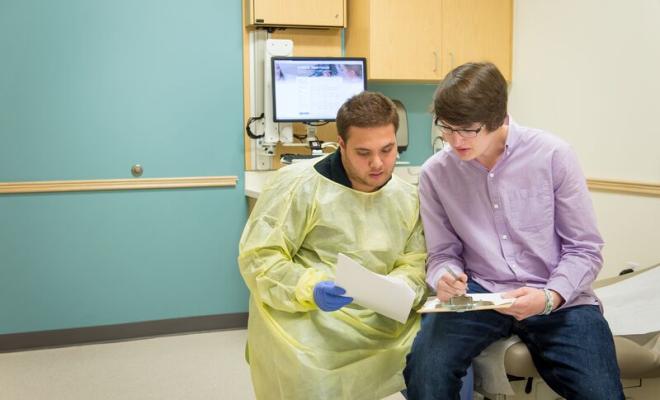Cystic Fibrosis Foundation Evidence-Based Guidelines for Management of Infants With Cystic Fibrosis
Borowitz D, Robinson KA, Rosenfeld M, et al. Cystic Fibrosis Foundation evidence-based guidelines for management of infants with cystic fibrosis. J Pediatr. 2009 Dec; 155(6 Suppl):S73-S93.
Although many treatment issues are the same for individuals with cystic fibrosis regardless of when they are diagnosed, some are unique to the population of newborn infants who may not have overt symptoms of the disease before being referred to a CF care center.
In 2009, the Cystic Fibrosis Foundation convened a committee of experts to develop guidelines for care based on available evidence for this distinct population of newly diagnosed infants. These guidelines contain detailed recommendations regarding care of infants beginning at the time of diagnosis, and discuss topics such as feeding, nutrition, airway clearance, diagnostic testing, treatment of infection, and chronic pulmonary therapies.
Methodology
The 2009 Evidence-Based Guidelines for Management of Infants With Cystic Fibrosis summarize recommendations from a multidisciplinary expert committee. These guidelines were created based on a systematic review of the evidence and expert opinion. The process for developing these guidelines included an expert committee, specific questions, systematic literature review, recommendations drafted, committee vote, and final recommendations.
The final recommendations were graded using the U.S. Preventative Task Force (USPSTF) Scheme. Find additional information about the USPSTF grading definitions.
Recommendations
Initial Diagnosis |
|
| Recommendations | Evaluation of the Evidence |
| 1. Treatment for infants diagnosed with CF by newborn screening (NBS) should be done at an accredited CF care center, with the goal of initial visit within 24-72 hours of diagnosis (1-3 working days in absence of overt symptoms). | Consensus recommendation |
Nutrition Recommendations |
|
| Pancreatic Function and Pancreatic Enzymes | |
| Recommendations | Evaluation of the Evidence |
| 2. For infants with CF under 2 years of age, pancreatic functional status should be measured by fecal elastase or coefficient of fat absorption (CFA) in all individuals. | Certainty: Low Benefit: Substantial Consensus recommendation |
| 3. For infants with CF under 2 years of age, pancreatic enzyme replacement therapy (PERT) should be initiated at a dosage of 2,000-5,000 lipase units at each feeding. Adjustment should not exceed 2,500 lipase units/kg at each feeding with a maximum daily dose of 10,000 lipase units/kg. | Certainty: Low Benefit: Substantial Consensus recommendation Recommended in the CF Foundation Consensus Report on Nutrition for Pediatric Patients and the European Consensus on Nutrition in Patients with CF |
4. For infants with CF under 2 years of age, PERT should be started:
|
Certainty: Low Benefit: Substantial Consensus recommendation |
5. For infants with CF under 2 years of age, PERT should not be started in infants with one or two CFTR mutations associated with pancreatic sufficiency, unless:
|
Consensus recommendation |
| 6. For all patients with CF, including those under 2 years of age, generic non-proprietary PERT should not be used. | Certainty: Low Benefit: Moderate Consensus recommendation Recommended in the CF Foundation Evidence-Based Practice Recommendations for Nutrition |
| Feeding, Vitamins, and Micronutrients | |
| Recommendations | Evaluation of the Evidence |
| 7. For infants with CF under 2 years of age, human milk should be the initial feeding type. | Certainty: Moderate Benefit: Substantial Grade: B |
| 8. For infants with CF under 2 years of age who are fed formula, standard infant formula (rather than hydrolyzed protein formulas) should be used. | Certainty: Low Benefit: Moderate Consensus recommendation |
| 9. For infants with CF under 2 years of age, calorie-dense feedings should be used if weight loss or inadequate weight gain is identified. | Certainty: Low Benefit: Moderate Consensus recommendation |
| 10. For infants with CF under 2 years of age, encourage positive feeding behaviors, such as by the provision of educational resources. | Certainty: Low Benefit: Moderate Consensus recommendation |
| 11. For infants with CF under 2 years of age, prescribe multivitamin supplements with recommended levels of vitamins A, D, E, and K for patients with CF shortly after diagnosis. | Certainty: Low Benefit: Moderate Consensus recommendation Recommended in the CF Foundation Consensus Report on Nutrition for Pediatric Patients |
| 12. For infants with CF under 2 years of age, blood levels of fat-soluble vitamins should be measured approximately two months after supplement initiation and annually thereafter, with more frequent measurements if values are abnormal | Consensus recommendation |
| 13. For infants with CF under 2 years of age, a trial of zinc supplementation (1 mg/kg/day of elemental zinc in divided doses for six months) may be given to some infants who are not adequately growing despite adequate caloric intake and PERT. | Certainty: Low Benefit: Moderate Consensus recommendation Recommended in the CF Foundation Consensus Report on Nutrition for Pediatric Patients |
| 14. For infants with CF under 2 years of age, supplement with 1/8 teaspoon table salt per day starting at diagnosis, increasing to 1/4 teaspoon of table salt per day by 6 months of age. | Certainty: Low Benefit: Moderate Consensus recommendation |
| 15. Patients aged 6 months to 2 years whose community water supply contains less than 0.3 ppm should be supplemented with fluoride 0.25mg/dl. | Consensus recommendation Recommended in the Center for Disease Control and Prevention Guidelines |
| 16. For children 1-12 years of age with growth deficits, intensive treatment with behavioral intervention in conjunction with nutritional counseling should be used to promote weight gain. | Consensus recommendation Recommended in the CF Foundation Evidence-based Practice Recommendations for Nutrition |
Pulmonary Recommendations |
|
| Recommendations | Evaluation of the Evidence |
| 17. For infants with CF under 2 years of age, a smoke-free environment should be provided and all caregivers be informed that cigarette exposure harms children with CF. | Consensus recommendation |
| Airway Clearance | |
| Recommendations | Evaluation of the Evidence |
| 18. For infants with CF under 2 years of age, airway clearance therapy should be initiated in the first few months of life. | Certainty: Low Benefit: Moderate Consensus recommendation |
| 19. For infants with CF under 2 years of age, use albuterol before percussion and postural drainage. | Certainty: Low Benefit: Moderate Consensus recommendation |
| 20. For infants with CF under 2 years of age, do not use the head-down position for percussion and postural drainage. (Percussion and postural drainage is recommended as the form of airway clearance for most infants in the Airway Clearance Guidelines.) | Certainty: Low Benefit: Moderate Consensus recommendation |
| Infection Control, Surveillance, and Treatment | |
|
Recommendations |
Evaluation of the Evidence |
| 21. For infants with CF under 2 years of age, newly diagnosed patients should be separated from other patients cared for in CF clinics until adequate infection control education has been provided to, and is understood by, the caregivers. | Certainty: Low Benefit: Moderate Consensus recommendation |
| 22. For infants with CF under 2 years of age, infection control measures should be implemented in compliance with CF Foundation recommendations to minimize transmission of bacterial infection to infants. | Consensus recommendation Recommended in the CF Foundation Consensus Conference on Infection Control |
| 23. Annual influenza vaccination is recommended for infants with CF ≥6 months of age, as well as all household members and health care providers caring for these infants. Household contacts and out-of-home caregivers for children with CF <6 months of age should receive annual influenza vaccination. | Consensus recommendation Recommended in American Academy of Pediatrics Guidelines and the CF Foundation Consensus Conference on Infection Control |
| 24. For infants with CF under 2 years of age, the use of palivizumab should be considered for prophylaxis of respiratory syncytial virus. | Certainty: Low Benefit: Moderate Consensus recommendation |
| 25. For infants with CF under 2 years of age, oropharyngeal cultures should be performed at least quarterly. | Certainty: Low Benefit: Moderate Consensus recommendation |
| 26. For infants with CF under 2 years of age, bronchoscopy and bronchoalveolar lavage should be considered in infants with signs or symptoms of lung disease, particularly with failed response to appropriate intervention. | Consensus recommendation |
| 27. For infants with CF under 2 years of age, the CF Foundation recommends against the prophylactic use of oral anti-staphylococcal antibiotics in asymptomatic infants. | Certainty: Low Benefit: Zero-negative Recommended in the CF Foundation Pulmonary Guidelines on Chronic Medications |
| 28. For infants with CF under 2 years of age, the CF Foundation recommends against the use of chronic antibiotics for prophylaxis to prevent Pseudomonas aeruginosa. | Certainty: Low Benefit: Zero-negative Consensus recommendation |
| 29. For infants with CF under 2 years of age, new acquisition of Pseudomonas aeruginosa, defined as initial acquisition or new acquisition after “successful” eradication therapy, should be treated with anti-pseudomonal antibiotics and increased airway clearance in the presence or absence of symptoms. | Certainty: Low Benefit: Moderate Consensus recommendation |
| 30. Infants with CF under 2 years of age who remain persistently colonized with Pseudomonas aeruginosa after two attempts at eradication should be treated chronically with alternate month tobramycin solution for inhalation. | Certainty: Low Benefit: Moderate Consensus recommendation |
| 31. For infants with CF under 2 years of age, there is insufficient evidence to recommend for or against active attempts to eradicate Staphylococcus aureus in asymptomatic infants. | Certainty: Low Benefit: Unknown Grade: I |
| 32. For infants with CF under 2 years of age, there is insufficient evidence to recommend for or against active attempts to eradicate methicillin-resistant Staphylococcus aureus (MRSA) in asymptomatic infants. | Certainty: Low Benefit: Unknown Grade: I |
Diagnostic Testing |
|
| Recommendations | Evaluation of the Evidence |
| 33. For infants with CF under 2 years of age, pulse oximetry measurements should be obtained with acute respiratory symptoms. | Certainty: Low Benefit: Substantial Consensus recommendation |
| 34. For infants with CF under 2 years of age, a baseline chest X-ray should be obtained within the first 3-6 months and again within the first two years of life. | Certainty: Low Benefit: Moderate Consensus recommendation |
| 35. For infants with CF under 2 years of age, the CF Foundation recommends against the use of chest computed tomography (CT) scans for routine surveillance. | Certainty: Low Benefit: Zero-negative Consensus recommendation |
| 36. For infants with CF under 2 years of age, chest CT scans should be considered in infants with signs or symptoms of lung disease who fail to respond to appropriate interventions. | Consensus recommendation |
| 37. For infants with CF under 2 years of age, infant pulmonary function tests (PFTs) should be considered as an adjunctive tool to monitor respiratory status. | Certainty: Moderate Benefit: Small Grade: C |
| 38. For infants with CF under 2 years of age, there is insufficient evidence to recommend for or against pulse oximetry routinely as an adjunctive tool to detect lung disease. | Certainty: Low Benefit: Small Grade: I |
Chronic Pulmonary Therapies |
|
| Recommendations | Evaluation of the Evidence |
| 39. For infants with CF under 2 years of age, dornase alfa (recombinant human DNase) may be used in symptomatic infants. | Certainty: Low Benefit: Moderate Consensus recommendation |
| 40. For infants with CF under 2 years of age, 7 percent hypertonic saline may be used in symptomatic infants. | Certainty: Low Benefit: Moderate Consensus recommendation |
| 41. For infants with CF under 2 years of age without airway reactivity or asthma, the CF Foundation does not recommend the use of inhaled corticosteroids to improve lung function or reduce exacerbations. | Certainty: Low Benefit: Zero-negative Consensus recommendation |
| 42. For infants with CF under 2 years of age, there is insufficient evidence to recommend for or against chronic azithromycin in patients colonized with Pseudomonas aeruginosa. | Certainty: Low Benefit: Unknown Grade: I |
Unanswered Questions
- What is the role of CFTR modulator therapy among infants with CF?
- What is the role of multiple breath washout in monitoring lung disease?
- What is the role of chest CT in monitoring lung disease?
- What is the most effective method of Pseudomonas aeruginosa eradication?
- What is the optimal dose of PERT for infants with CF, particularly in early infancy?
Further Reading
Relevant manuscripts published after the original guidelines are listed below. These manuscripts have not been reviewed or endorsed by the guidelines committee.
- Borowitz D, Gelfond D, Maguiness K, Heubi JE, Ramsey B. Maximal daily dose of pancreatic enzyme replacement therapy in infants with CF: a reconsideration. J Cyst Fibros. 2013 Dec; 12(6):784-5. doi: 10.1016/j.jcf.2013.05.011. Epub 2013 Jun 26.
- Freitas DA, Dias FA, Chaves GS, et al. Standard (head-down tilt) versus modified (without head-down tilt) postural drainage in infants and young children with cystic fibrosis. Cochrane Database Syst Rev. 2015 Mar 10;(3):CD010297. doi: 10.1002/14651858.CD010297.pub2.
- Jain K, Wainright C, Smyth AR. Bronchoscopy-guided antimicrobial therapy for cystic fibrosis. Cochrane Database Syst Rev. 2016 Jan 21;(1):CD009530. doi: 10.1002/14651858.CD009530.pub3.
- Langton Hewer SC, Smyth AR. Antibiotic strategies for eradicating Pseudomonas aeruginosa in people with cystic fibrosis. Cochrane Database Syst Rev. 2017 Apr 25;4:CD004197. doi: 10.1002/14651858.CD004197.pub5.
- Ramsey KA, Rosenow T, Turkovic L, et al. Lung Clearance Index and Structural Lung Disease on Computed Tomography in Early Cystic Fibrosis. Am J Respir Crit Care Med. 2016 Jan 1;193(1):60-7. doi: 10.1164/rccm.201507-1409OC.
- Reix P, Metecki S, Fayon M. Early Lung disease in infants with cystic fibrosis. Diagnostic tools and possible therapeutic pathways. Rev Mal Respir. 2016 Feb; 33(2):102-16. doi: 10.1016/j.rmr.2015.06.017. Epub 2016 Feb 2.
- Robinson KA, Odelola OA, Saldanha IJ. Palivizumab for prophylaxis against respiratory syncytial virus infection in children with cystic fibrosis. Cochrane Database Syst Rev. 2016 Jul 20;7:CD007743. doi: 10.1002/14651858.CD007743.pub6. Review.
- Rosenfeld M, Ratjen F, Brumback L, et al. Inhaled hypertonic saline in infants and children younger than 6 years with cystic fibrosis: the ISIS randomized controlled trial. JAMA. 2012 Jun 6;307(21):2269-77. doi: 10.1001/jama.2012.5214.
- Sanders DB, Emerson J, Ren CL, et al. Early Childhood Risk Factors for Decreased FEV1 at Age Six to Seven Years in Young Children with Cystic Fibrosis. Ann Am Thorac Soc. 2015 Aug;12(8):1170-6. doi: 10.1513/AnnalsATS.201504-198OC.
- Subbarao P, Stanojevic S, Brown M, et al. Lung clearance index as an outcome measure for clinical trials in young children with cystic fibrosis. A pilot study using inhaled hypertonic saline. Am J Respir Crit Care Med. 2013 Aug 15;188(4):456-60. doi: 10.1164/rccm.201302-0219OC.
- Smyth AR, Rosenfeld M. Prophylactic anti-staphylococcal antibiotics for cystic fibrosis. Cochrane Database Syst Rev. 2017 Apr 18;4:CD001912. doi: 10.1002/14651858.CD001912.pub4.
- Visca A, Bishop CT, Hilton S, Hudson VM. Oral reduced L-glutathione improves growth in pediatric cystic fibrosis patients. J Pediatr Gastroenterol Nutr. 2015 Jun;60(6):802-10. doi: 10.1097/MPG.0000000000000738.
- Rosenfeld M, Ratjen F, Brumback L, et al. Inhaled hypertonic saline in infants and children younger than 6 years with cystic fibrosis: the ISIS randomized controlled trial. JAMA. 2012 Jun 6;307(21):2269-77. doi:10.1001/jama.2012.5214.
Use of These Guidelines
The CF Foundation intends for this executive summary of its guideline to summarize the published guideline. The published guideline summarizes evidence, and provides reasonable clinical recommendations based on that evidence, to clinicians, patients, and other stakeholders. Care decisions regarding individual patients should be made using a combination of these recommendations, the associated benefit-risk assessment of treatment options from the clinical team, the patient's individual and unique circumstances, as well as the goals and preferences of the patients and families that the team serves, as a part of shared decision-making between the patient and clinician.
This executive summary was prepared by:
Sylvia Szentpetery, MD, (Children's Hospital of Pittsburgh) and Margaret Rosenfeld, MD, MPH, (Seattle Children's Hospital)
The guidelines were published in December 2009, they were reviewed in July 2021 and it was determined that no update is needed at this time.



